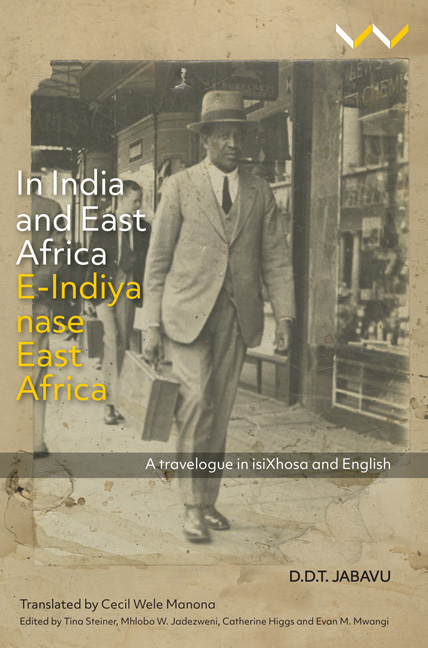Book contents
- Frontmatter
- Contents
- List of Illustrations
- Maps
- Acknowledgements
- Networks of Solidarity: D.D.T. Jabavu’s Voyage to India
- Revisiting D.D.T. Jabavu, 1885–1959
- Notes on the Original and the Translation
- In Praise of Cecil Wele Manona, 1937–2013
- E-Indiya nase East Africa
- In India and East Africa
- Afterword: Jabavu and African Translations for the Future
- References
- Editors’ Biographies
- Index
In Praise of Cecil Wele Manona, 1937–2013
Published online by Cambridge University Press: 27 March 2020
- Frontmatter
- Contents
- List of Illustrations
- Maps
- Acknowledgements
- Networks of Solidarity: D.D.T. Jabavu’s Voyage to India
- Revisiting D.D.T. Jabavu, 1885–1959
- Notes on the Original and the Translation
- In Praise of Cecil Wele Manona, 1937–2013
- E-Indiya nase East Africa
- In India and East Africa
- Afterword: Jabavu and African Translations for the Future
- References
- Editors’ Biographies
- Index
Summary
Cecil Wele Manona began his career as a school teacher in 1960, became a radio announcer and producer, a translator, and eventually a highly regarded anthropologist of the Eastern Cape region of South Africa. His work explored themes of ‘land tenure, education, migrancy options, marriage patterns, family composition’, following the introduction of apartheid in 1948. This complex set of factors shaped the limited opportunities available to black people living in the rural Ciskei and Transkei regions of the Eastern Cape, and to migrants to the small urban centre of Grahamstown, both during the apartheid era and after 1994, in the nascent democratic state.
In 1973, Cecil Manona earned a BA in anthropology from the University of South Africa. Two years later, he joined the Institute of Social and Economic Research (ISER) at Rhodes University in Grahamstown as a research assistant. He would earn three advanced degrees and retire as a senior research officer after more than 25 years at ISER. I met Cecil at Yale University in January 1986 when he took up a six-month sabbatical as a fellow of Yale's Southern African Research Program. I was a graduate student. Cecil was a published scholar whose work included A Socio-Economic Survey of the Amatola Basin (1981), and a study for the Second Carnegie Inquiry into Poverty and Development in South Africa, ‘Migration from the Farms to Towns and Its Implications for Urban Adaptation’ (1984).
Thinking back to this first encounter with Cecil, I recall a distinguished, reserved and thoughtful man, usually smoking a pipe when circumstances allowed. One of my flatmates, William Munro, knew Cecil from ISER. When we spoke recently, William reminded me of Cecil's shock at a yearly spring ritual at Yale in the mid-1980s: graduating students stacking their still usable furniture (beds, desks, tables and chairs) on the pavement to be picked up by the city's rubbish collection service. Cecil had commented that these items, cast off with little apparent regret, could have furnished the homes in entire small villages in South Africa's Eastern Cape. It was a reminder of the deep inequality that characterised South Africa's political economy, then and now.
- Type
- Chapter
- Information
- In India and East Africa / E-Indiya Nase East AfricaA Travelogue in isiXhosa and English, pp. 49 - 54Publisher: Wits University PressPrint publication year: 2019



